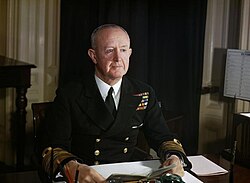Andrew Cunningham, 1st Viscount Cunningham of Hyndhope

Admiral of the Fleet Andrew Browne Cunningham, 1st Viscount Cunningham of Hyndhope, KT, GCB, OM, DSO (7 January 1883 – 12 June 1963), familiarly known as "ABC", was a famous British Admiral of the Second World War, winning distinction in Mediterranean battles such as the Attack on Taranto, and the Battle of Cape Matapan in 1940 and 1941, then serving as First Sea Lord from 1943 to 1946. He was the older brother of General Sir Alan Cunningham.
Cunningham joined the Royal Navy as a cadet aboard the training ship HMS Britannia in 1897. He was a highly decorated officer during the First World War.
Cunningham was Commander-in-Chief, Mediterranean, from 1939 to 1942, and in 1943. In this role, he successfully negotiated, after the French surrender, with the French Admiral Rene-Emile Godfroy for the demilitarisation and internment of a French squadron at Alexandria. He had been under orders to prevent the French ships leaving port and to complete negotiations on 3 July. The deadline was overrun but Cunningham and Godfroy, who had been on good terms, came to an agreement on 4 July.
Cunningham was also involved in many significant naval encounters, most notably an aircraft carrier launched attack on the Italian fleet at Taranto, destroying one Italian battleship and seriously damaging two others. The success of this attack may have been inspiration for the larger scale Japanese attack on Pearl Harbour later in the war. Cunningham was made Allied naval commander Expeditionary Force under General Eisenhower in 1942, and served as First Sea Lord and Chief of Naval Staff from 1943-6.
He was made a Knight Grand Cross of the Bath in 1939, and a Knight of the Thistle in 1945. In the same year he was elevated to the House of Lords as Baron Cunningham of Hyndhope, of Kirkhope in the County of Selkirk. In 1946 he was admitted to the Order of Merit and advanced to a viscountcy as Viscount Cunningham of Hyndhope. He acted as Lord High Steward at the coronation of Queen Elizabeth II in 1953. Upon his death without issue in 1963, both of these titles became extinct.
During the evacuation at the end of the Battle of Crete when Cunningham was determined that the "navy must not let the army down", when army generals feared he would lose too many ships, Cunningham famously said, "It takes three years to build a ship; it takes three centuries to build a tradition". The 'never say die' attitude of Cunningham and the men under his command meant that of 22,000 men on Crete 16,500 were rescued at the loss of three cruisers and six destroyers.
References
- Admiral A.B. Cunningham, A Sailor’s Odyssey (Hutchinson & Co, London, 1952)
- J. Winton, Cunningham: The Greatest Admiral since Nelson (London, 1998)
- Stephen Roskill: Churchill and the Admirals
- Stephen Roskill: The War at Sea (UK Official History)
- S.W.C. Pack: Cunningham the Commander
- Corelli Barnett: Engage the Enemy More Closely
External links
- 1883 births
- 1963 deaths
- Anglo-Irish people
- British military personnel of World War I
- British military personnel of World War II
- Companions of the Distinguished Service Order
- Knights Grand Cross of the Order of the Bath
- Knights of the Thistle
- Lord High Stewards
- Lords of the Admiralty
- Members of the Order of Merit
- Royal Navy admirals
- Baronets in the Baronetage of the United Kingdom
- Viscounts in the Peerage of the United Kingdom
- First Sea Lords

